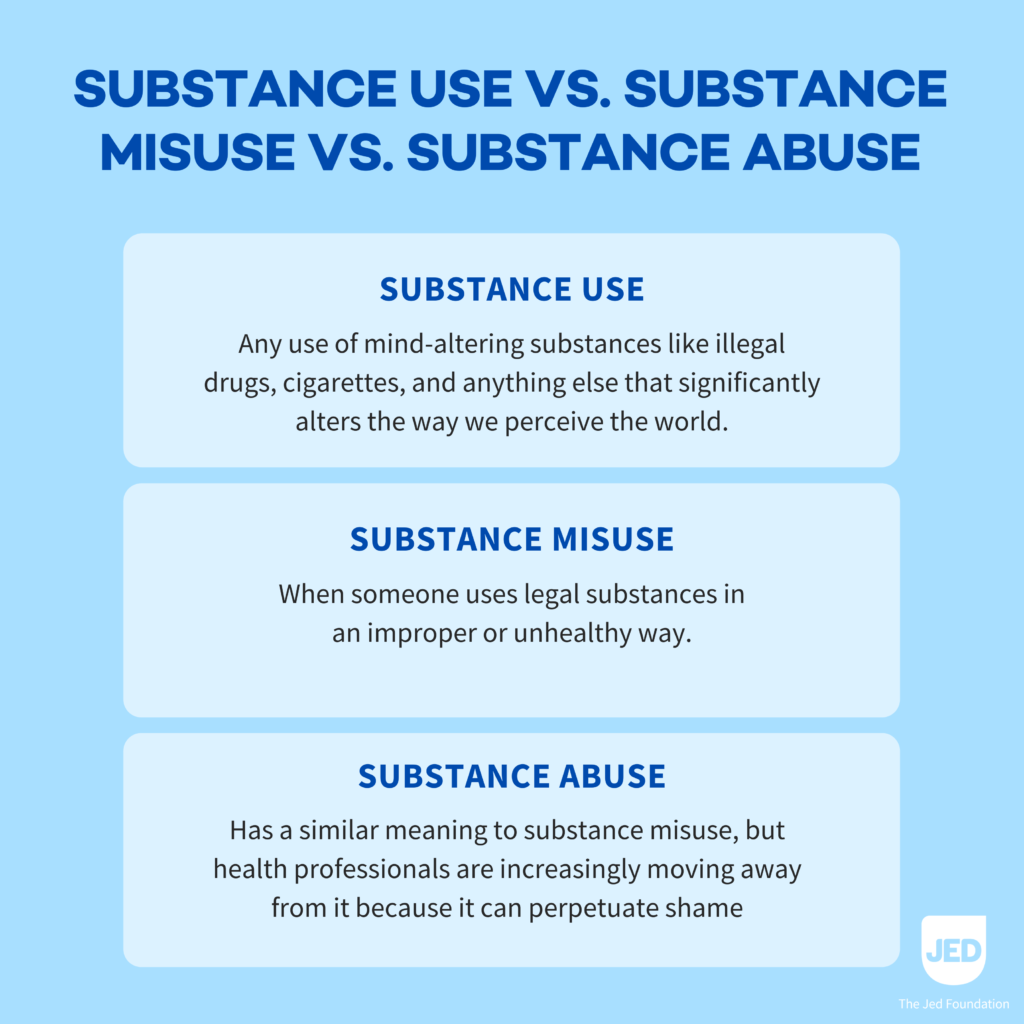Understanding Substance Misuse and Addiction Disorders

Most of us will try one or more mind-altering substances at some point in our lives, either for recreational purposes or because it was prescribed to us. When you take a drink at a party, smoke a joint, or take a pill that wasn’t prescribed to you, it often starts as casual, social use. But over time, what starts out as a way to experiment or have fun can lead to a substance misuse and “addiction”—what health professionals call a substance use disorder.
Misusing substances can have serious effects on your physical health and emotional well-being, and can even change the way your brain functions. But with treatment and support, it is possible to recover from a substance use disorder.
What’s the Difference Between Substance Use and Substance Misuse?
People often use the terms “substance use,” “substance misuse,” and “substance abuse” interchangeably—but there are differences that are important to understand.
Substance use refers to any use of mind-altering substances like illegal drugs, cigarettes, inhalants, and anything else that significantly alters the way we perceive the world. Substance use can be recreational and casual or a regular part of daily life. Any substance use can become problematic. When it does, it becomes substance misuse or abuse.
When someone uses legal substances in an improper or unhealthy way, that’s referred to as substance misuse. For example, if you occasionally have a casual drink with a friend, that is considered casual or recreational alcohol use. If you regularly seek out alcohol to deal with stress or to numb negative emotions, that’s substance misuse.
Similarly, if you take medication prescribed by a doctor according to the instructions you’re given, you would be considered a proper user of a prescribed medication. If you use the medication in ways other than how you were directed, that would be considered substance misuse.
What’s the Difference Between Substance Misuse and Substance Abuse?
Substance abuse has a similar meaning to substance misuse. Though you may hear the term “substance abuse,” health professionals are increasingly moving away from it because it can perpetuate shame, which in turn may keep people struggling with substance misuse from seeking help. Instead, it is increasingly common to hear the terms, “substance misuse” or “substance use disorder.”
Use of terms like “substance use disorder” in place of stigmatizing terms like “addict,” or “alcoholic” are preferable because these terms focus on the disorder the person is struggling with rather than placing personal blame on the person. Think about it this way: Saying “He is an alcoholic” makes it about a person’s character, while saying “He has a substance use disorder” places emphasis on the condition rather than on substance use as a fundamental personality trait.
Substance use disorders can be mild, moderate, or severe. When someone is living with a substance use disorder, they typically struggle with controlling the impulse to use their substances of choice—even when there are negative consequences. Over time, their use can cause behavioral changes, physical symptoms, and even change the way a person’s brain functions.
If you or someone you know is struggling with substance use disorder, contact the Substance Abuse and Mental Health Services Administration (SAMHSA) National Helpline for a free, confidential conversation at any time.

How Common is Substance Misuse?
Substance misuse is a significant challenge facing teens and young adults.
- Recent studies show that 14.4 million adults and over 400,000 teenagers in the U.S. have an alcohol use disorder.
- Marijuana use is rising in young adults, as is the use of vapes for ingesting marijuana and nicotine.
- Misuse of prescription drugs is the fastest-growing drug problem affecting teenagers today. Misuse of over the counter medicines like cough medicine, is also a growing problem among teens as young as 13.
Substance Use and Mental Health: What’s the Connection?
Substance misuse and mental health issues are closely linked. Many people who struggle with substance misuse also struggle with a mental health challenge. Research shows that one in four adults in the U.S. with serious mental health issues also have problems with substance misuse. And people who struggle with addiction are twice as likely to have a mood or anxiety disorder.
Similarly, people who are struggling with a mental health issue can turn to drugs and alcohol as a way of coping—behaviors that can compound their existing mental health challenges.
In some cases, drug use is what causes a person’s mental health issues. For example, using cocaine can lead to anxiety, misusing marijuana is linked to increased depression, and misusing prescription medications can lead to anger, paranoia, and even psychosis.
With mental health issues and substance use so closely linked, does one condition cause the other? Not necessarily. Mental health issues and substance use disorders do share some common causes, including genetics, brain development, and traumatic experiences early in life—which helps to explain why they occur together so often.
If you or someone you know is using alcohol or drugs to cope with mental health issues, or if you believe alcohol or drug use is making your mental health challenges worse, contact the Substance Abuse and Mental Health Services Administration (SAMHSA) National Helpline for a free, confidential conversation at any time.
Signs of Substance Misuse
In its most serious form, a substance use disorder can have serious, potentially life-threatening consequences. If someone is misusing substances, you may notice a change in their behavior at work, school, in their relationships, or around money.
But sometimes, people who are struggling with drugs or alcohol will try to hide their behavior out of guilt, shame, or denial that they have a problem. If you suspect someone you know is struggling with drugs or alcohol, there are warning signs you can watch out for:
Changes in performance at school or work
- Frequently missing school or work
- A sudden disinterest in work or their usual school activities
- A drop in their grades or work performance
Changes in physical health
- Lack of energy or motivation
- Red eyes or enlarged pupils
- Tremors, slurred speech, or impaired coordination
- Changes in appetite, weight loss or weight gain
- Changes in sleep patterns
Changes in appearance
- Neglecting their appearance, a lack of interest in clothing, grooming or looks
- Unusual smells on their breath, body, or clothing
Changes in behavior
- Sudden change in friends, favorite hangouts, or hobbies
- Being secretive about where he or she goes with friends
- Unexplained drastic changes in relationships with friends or family
- Barring family members from entering their room
- Sudden mood swings, irritability, depression or angry outbursts
- Periods of unusual hyperactivity, agitation, or giddiness, often followed by low motivation
- Appearing fearful, anxious, or paranoid, with no apparent reason
Changes in money management
- Unexplained financial problems, or making sudden requests for money without an explanation
- Stealing or taking other people’s money or valuables which can be exchanged for substances
Changes in relationship to substances
- Using drugs or alcohol while driving or operating machinery
- Experiencing legal problems related to drugs or alcohol
- Using drugs or alcohol even though it causes problems in their relationships
- Hiding drugs or alcohol throughout their home
Getting Help for Substance Misuse
It’s important to seek help for substance misuse. If someone you know is misusing substances, express your concern and, if they’re open to it, offer to support them as they seek help. If you are personally struggling with substance misuse, there are many treatment options available to you:
- If you are in college, take our alcohol and substance misuse screening questionnaire to find resources available on your campus.
- Check out our resources on how to manage issues with drugs and alcohol.
- Reach out to someone you trust, like a friend or family member, and ask for their support in finding treatment.
- Reach out anonymously to SAMHSA’s National Helpline.
- Get connected to treatment options near you through the SAMHSA Behavioral Health Treatment Services Locator.
It is important to know that a substance use disorder doesn’t define who you are. With help, virtually all substance misuse disorders are treatable. Even if you have started the recovery process before and have lapsed or are otherwise still struggling, it’s never too late to get the help you need.





